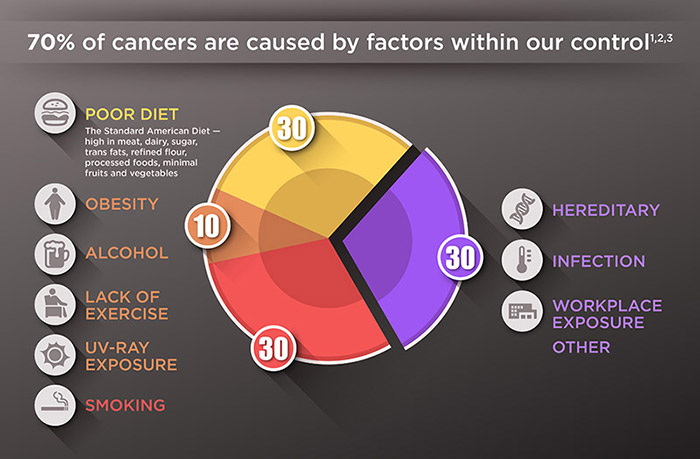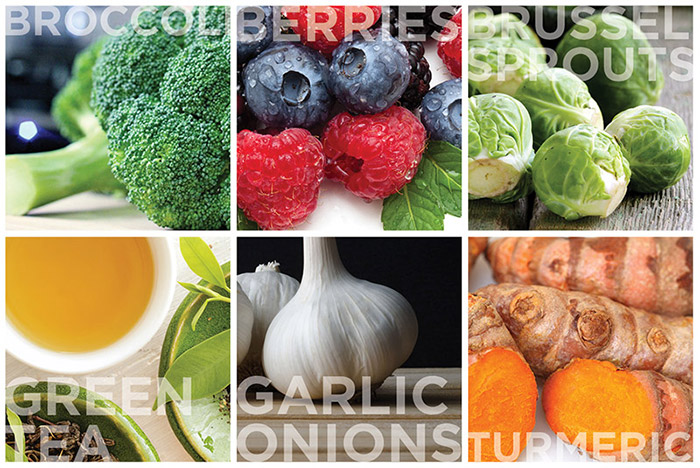
10 Super foods that have anti-cancer properties to help you in reducing your risk of cancer
—
Is it just me, or does it seem like more and more people are getting cancer? Last year I had three good friends diagnosed with cancer and one more last week — all between the ages of 39 and 51. One of those dear friends died of colon cancer eight months after diagnosis. It was especially heart breaking because he was an amazing person who was enormously talented (he was a research chemist) and a wonderful friend who brought so many people together. If you were his neighbor, you were his friend, soon to be invited over for dinner.
Sadly almost 40% percent of men and women in the U.S. will be diagnosed with cancer at some point during their lifetimes. Many people think if they are diagnosed with cancer there is little they can do, but thankfully this is not true. Since my friend died in September, I have immersed myself in research about what we can do to help prevent cancer in our bodies by improving our diet and making lifestyle changes. I am happily surprised by how much information and scientific data is available to us in this regard.
70% of all cancers are linked to lifestyle factors — factors well within our control — like poor diet, smoking, alcohol consumption, lack of exercise and obesity.1,2,3
The remaining 30 % (15% which are hereditary and 15% which are related to viral risk factors, workplace exposure, or pollution) have historically been thought to be out of our control — but we are now learning that even these cancers can be affected with shifts in our belief patterns.
There is a lot that is in our control after all — we just need to adopt the tools for change.

Many factors can contribute to the onset of cancer including lifestyle, stress, gut health, emotional wellbeing and environmental toxins, but one of the most important factors to consider is your daily diet. In short, food acts as medicine for the body, especially if enjoyed fresh and in its most natural form.
More specifically, it would be wise to look at our daily diet in terms of cancer prevention. Are you eating the Standard American Diet (otherwise know as the SAD) — a diet high in meat, dairy products, sugar, processed white flour, and processed foods known to support cancer growth? Or are you eating a diet rich in colorful fruits and vegetables that are also known as ‘anti-cancer foods’?
Anti-cancer foods
In the last 15 years, researchers have been studying effects of certain fruits and vegetables on cancer cells. It turns out most of us have microscopic cancer cells growing in our bodies all the time. This should not be cause for alarm, however — your immune system is usually able to detect and destroy these cancer cells before they mature. Fortunately, researchers have identified a group of especially powerful cancer-fighting foods and beverages that can help the body reduce toxin build up, repair cell damage and help to limit ‘angiogenesis’ — the process of growing new blood vessels that support tumor growth.
In one study, researchers examined 34 vegetable extracts on 8 different cancer tumor cell lines.[4] They found the most powerful anti-cancer food was garlic. Garlic stopped cancer cell growth completely in all 8 types of cancer tested — breast cancer, brain cancer, lung cancer, pancreatic cancer, prostate cancer, kidney cancer, and stomach cancer. All members of the Allium family including leeks, scallions and yellow onions were also powerful inhibitors. The second most powerful group was cruciferous vegetables — Brussels sprouts, kale, cabbage, broccoli and cauliflower along with beets and leafy greens like spinach.
So what should you be eating?
- The most important thing you can do is to eat a diet rich in whole foods from the plant kingdom and low in foods from the animal kingdom.
- Eat the rainbow. Fruits and vegetables contain a variety of phytonutrients that have beneficial antioxidant properties depending on their color.
- Focus on anti-cancer foods.

These foods in particular have been found to have cancer-fighting properties. Eat some of these foods every day:
- Garlic, onions, scallions, leeks (anything from the allium family)
- Broccoli, cabbage, kale, Brussels sprouts, cauliflower (all the cruciferous vegetables)
- Berries
- Mushrooms
- Spinach and other greens
- Nuts and seeds
- Beans (legumes — lentils, chick peas, kidney beans, fermented soybeans),
- Cooked tomatoes
- Turmeric
- Green Tea
___________________________
In a case-controlled multi-country study, people who ate 1/2 cup of onions a day had less than half as many cancers as people who rarely consumed onions.[5]
Three servings of cruciferous vegetables per week decreases prostate cancer risk by 41 percent.[6]
Drinking 3 cups of Japanese green tea a day resulted in 57% fewer recurrences in patients with breast cancer tumors.[7]
___________________________
Of course, food is not the entire answer when it comes to cancer prevention. In addition to eating a nutrient-rich diet and adding anti-cancer foods into your diet each day, it’s important to take a holistic mind and body approach, factoring in activities that help to lower your stress levels like yoga and meditation. These things combined could make a big difference in how your body is able to continuously thwart the growth and maturity of new cancer cells.
Learning about how the body can fight cancer cells with the support of powerful anti-cancer foods has caused me to feel very hopeful. I invite you to say NO to the SAD and instead, say YES to feeling vibrant and energetic by choosing real, fresh, whole food. Say YES to being as healthy as possible so you are able to fight off diseases like cancer. The time to take control of your health is now.
—
Attributions:
- Béliveau R, Gingras D. Foods to Fight Cancer — Essential Foods to help prevent cancer. (New York:Random House, 2006).
- Song Wu, et al. Substantial contribution of extrinsic risk factors to cancer development. Nature 2016, 529:43-47.
- Willett WC. Balancing life-style and genomics research for disease prevention. Science.2002;296(5568):695–698. doi: 10.1126/science.1071055.
- Bolvin, et al. Antiproliferative and antioxidant activities of common vegetables: A comparative study. Food Chemistry 112 (2009) 374–380
- Galleon C, Peucchi C, Levi F, et al. Onion and garlic use and human cancer. Am J Clin Nutr 2006;84(5): 1027-32.
- Cohen JH, Krystal AR, Stanford JL. Fruit and vegetable intake and prostate cancer risk. J Natl Cancer Inst 2000;92(1):61-68.
- Inoue M, et al. Regular consumption of green tea and the risk of breast caner recurrence: Follow-up study from the Hospital-Based Epidemiological Research Program at Aichi Cancer Center, Japan, Cancer Letters 167, 2:(2001):175-182.
You may also enjoy Interview: Kelly Brogan, MD | A Mind Of Your Own with Kristen Noel